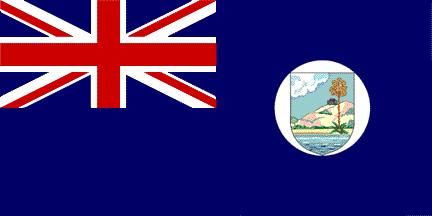
image by Martin Grieve, 1 Febuary 2004

Last modified: 2014-03-28 by zoltán horváth
Keywords: antigua | antigua and barbuda |
Links: FOTW homepage |
search |
disclaimer and copyright |
write us |
mirrors

image by Martin Grieve, 1 Febuary 2004
See also:
In use 1956-1958, 1961- 1967 ().
Jaume Ollé
Smith 1980 [smi80] show the red
ensign as the civil ensign. The flag is adopted in 1967 but it
seems that it was "in limited use" until recently
(where "recently" is undefined). Smith 1975 mark it as
civil and state flag and state ensign (in UK section), white 1980
he show it as civil and state flag (and clear red ensign for
civil ensign). It may be that things were changed in 1981 (1st
November) when independence was achieved. Until 1981 the
undefaced red ensign was the civil ensign in AG.
Željko Heimer, 6 January 2001
Until 1956 the appropriate Blue Ensign for any government
operated boat in Antigua was that of the Leeward Islands. When
the Federation was dissolved in 1956 a flag badge for Antigua was
introduced. It was the shield that had represented Antigua
in the Leeward Islands Arms granted in 1909. (This was also the
source of the badges for Dominica, Montserrat and Virgin
Islands). Arms were granted when Antigua became an Associated
State in 1967 and this was the flag badge until independence in
1981.
Special maritime flags for Governors were introduced in 1869. It
is not clear whether the 1956 badge was ever used on a UJ by the
Administrator. He was replaced by a Governor and the 1967 badge
was used by him.
David Prothero, 14 January 2001
As far as I know only a few colonies used defaced red ensigns,
but not Antigua. The plain red ensign was in use until
independence.
Ralf Stelter, 5 Febuary 2001
Antigua (pronounced "an - teeg - ah") - Information
gleaned from "The Flag Bulletin XXI: 6/97" and a nice
scan from David Prothero, in full colour I may add, allows us to
provide the list with three images of the flags from 1957 to
1967.
Let us start with the information provided by the journal
mentioned above:
"Prior to associated statehood, Antigua apparently had no
coat of arms, although a seal for public business had existed
since the early 19th century. The design of that seal,
represented in colours on a shield. The shield had been
incorporated with similar "armorialized seals on a shield of
blue and white wavy stripes in a coat of arms granted to the
Colony of the Leeward Islands on 10 April 1909 (*). After
the Colony of the Leeward Islands was dissolved on 1 July 1956
flag badges were developed for its former components, which
became separate Colonies. The flag badge of Antigua, represented
on a white disk on the fly of the British Blue Ensign for use on
government vessels, was the shield which had appeared in the arms
of the Leeward Islands. It represented blue water in the
foreground and a light blue sky with white clouds at the top.
Between, in natural pastel shades, were a beach, bushes, and
hills surmounted by a gray building. The most prominent feature
-- on the sinister side of the shield -- was an agave plant. This
badge, replaced at the time of associated statehood, had been
introduced sometime in 1957."
(*) The crest of that coat of arms was a pineapple closely
resembling the one in the Antigua crest. The background of the
Leeward Islands shield may have inspired the similar blue and
white wavy stripes found in the flag of The West Indies, an
abortive federation (1957-1962) of which Antigua was a part. That
flag and the flag badge of the Leeward Islands are described in
an article on the new flag of Dominica in THE FLAG BULLETIN,
Volume XVII, No. 6 pp. 166-169.
The journal also includes a black and white drawing of the Blue
Ensign, with the badge of the Colony depicted within a disk.
No mention was made of a Union Garland for the Governor, but I
include this as I believe one probably existed.
Martin Grieve, 1 Febuary 2004
Antigua used the shield but not Arms in 1956 flag. It was
changed to the arms in 1967..
David Prothero, 8 April 2005
Red Ensign
From 1962 reported without white disk.
Jaume Ollé'